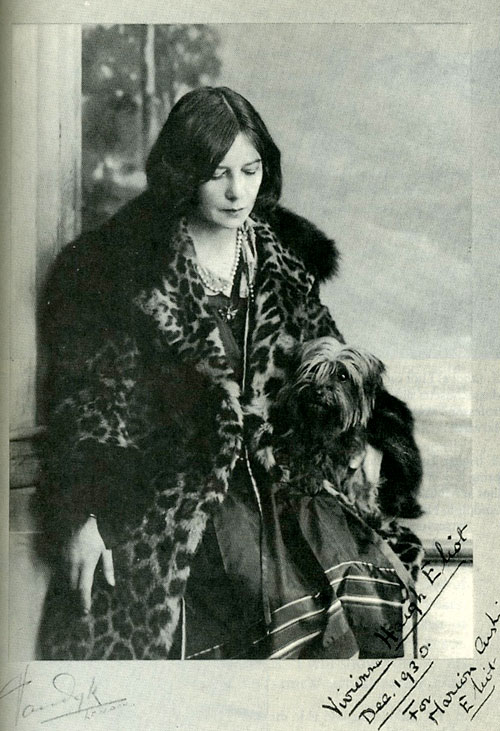Vivienne Eliot
From 'Vivienne Eliot' in the Oxford Dictionary of National Biography (2004). For fuller details see Eliot: An Imperfect Life.

...Repressed and shy, with a family history of puritan divines and memories of unfulfilled love for a proper Bostonian called Emily Hale, Eliot was jolted to life by the flamboyant Vivienne, her 'amusing' name, and her daring to smoke in public. She proved a pliant dancer, keen to follow when Eliot began to 'dip' in his one-step in a style unknown in England. It appealed to him that Vivienne would never say she liked Bach or Cézanne if she didn't. She looked like an actress in her bold colours: she owned a scarf-dress in the post-war years and, in the thirties, got herself up in a cape and waistcoat, and flourished a cigarette-holder. This was not the kind of woman a gentleman could introduce to his mother. Though her parents lived comfortably in Hampstead, London, Eliot's old New England background was very much grander.
They married impulsively without waiting to tell their parents. The ceremony took place on 26 June 1915 in the presence of Vivienne's friend Lucy Ely Thayer and aunt Lillia C. Symes at the Hampstead register office near Vivienne's home at 3 Compayne Gardens. Vivienne was going to save Eliot for poetry, which meant keeping him from academe. He had been due to return to America, but rebelled against a future as a Harvard philosopher. An English marriage made it possible for him to deal the prospect an all-out blow, and Vivienne stood up for him against the disapproval of the Eliot family. 'Tom knows perfectly well that I share his feeling over the poetry... . I look upon Tom's poetry as real genius', she told his brother. 'I provide the motive power', she added, 'I do shove'. Later she was incredulous that her creative (as opposed to destructive) bond with Eliot should have been obliterated during his lifetime. During their early years together her hatred of the 'fug and slop' of sentiment, her alienation from most people, and her susceptibility to horror matched and promoted the state of mind which, in Eliot's own words, 'led to The Waste Land'. Vivienne, advising on a draft of the poem, wrote 'WONDERFUL' next to the voice of the distraught wife in the second part. Later, in her copy of his Poems, 1909-1925, Eliot noted that only she would understand them... .
